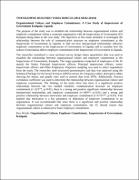| dc.contributor.author | Twesigomwe, Rukundo Taria Dorcus | |
| dc.date.accessioned | 2018-11-16T10:03:40Z | |
| dc.date.available | 2018-11-16T10:03:40Z | |
| dc.date.issued | 2014 | |
| dc.identifier.citation | Twesigomwe, R. T. D. (2014). Organisational Culture and Employee Commitment: A Case Study of Inspectorate of Government Kampala, Uganda. Uganda Martyrs University, Nkozi: Uganda Martyrs University. | en_US |
| dc.identifier.uri | http://hdl.handle.net/20.500.12280/1041 | |
| dc.description.abstract | TWESIGOMWE RUKUNDO TARIA DORCUS (2014-M102-20110)
Organisational Culture and Employee Commitment: A Case Study of Inspectorate of Government Kampala, Uganda
The purpose of the study was to establish the relationship between organisational culture and employee commitment within a corporate organisation with the Inspectorate of Government (IG) Kampala being taken as the case study. The objectives of this study included; to investigate the relationship between the role of communication structure on employee commitment at the Inspectorate of Government in Uganda, to find out how interpersonal relationships influence employee commitment at the Inspectorate of Government in Uganda and to examine how the culture of motivation affects employee commitment at the Inspectorate of Government in Uganda.
The researcher considered a cross sectional survey design where quantitative data was used to establish the relationship between organisational culture and employee commitment at the Inspectorate of Government, Kampala. The target population comprised of employees of the IG mainly the Senior Principal Inspectorate officers, Principal inspectorate officers, senior inspectorate officers and Other Employees. Purposive sampling was used to select respondents from the study. The researcher used structured questionnaires and data was analysed using the Statistical Package for the Social Sciences (SPSS) version 20. Frequency tables, descriptive tables showing the means, and graphs were used to present data from SPSS. Additionally, Pearson correlation coefficient was used to determine the relationship between organisational culture and employee commitment. The findings of the study show that there is a significant positive relationship between the two studied variables; communication structure on employee commitment (r=.621**; p<0.01), there is a strong and positive significant relationship between interpersonal relationships and employee commitment (r=.689**; p<0.01) and a strong and positive relationship between motivation and employee commitment (r=0.731**; p<0.01). This implied that motivation is a key parameter or dimension of employee commitment in an organisation. It was recommended that since there is a significant and positive relationship between organisational culture and employee commitment, the IG should ensure that organisational culture is enhanced to foster employee commitment.
Key Words: Organisational Culture, Employee Commitment, Inspectorate of Government, Kampala. | en_US |
| dc.language.iso | en | en_US |
| dc.publisher | Uganda Martyrs University | en_US |
| dc.subject | Organisational Culture | en_US |
| dc.subject | Employee Commitment | en_US |
| dc.subject | Inspectorate of Government, Kampala | en_US |
| dc.title | Organisational Culture and Employee Commitment: A Case Study of Inspectorate of Government Kampala, Uganda. | en_US |
| dc.type | Thesis | en_US |


